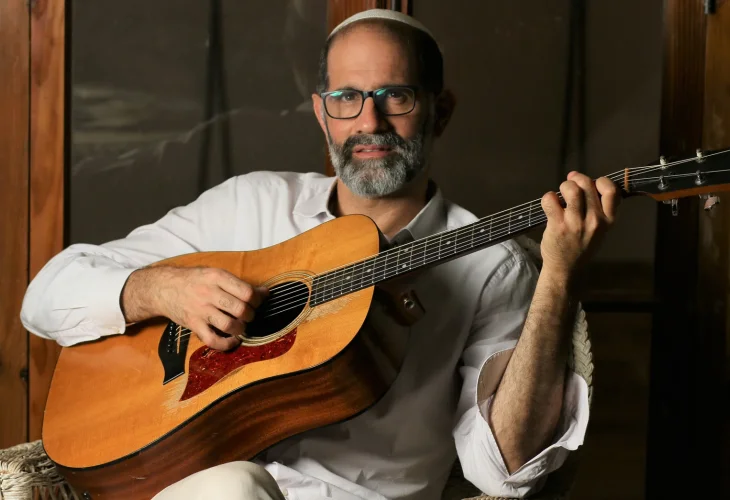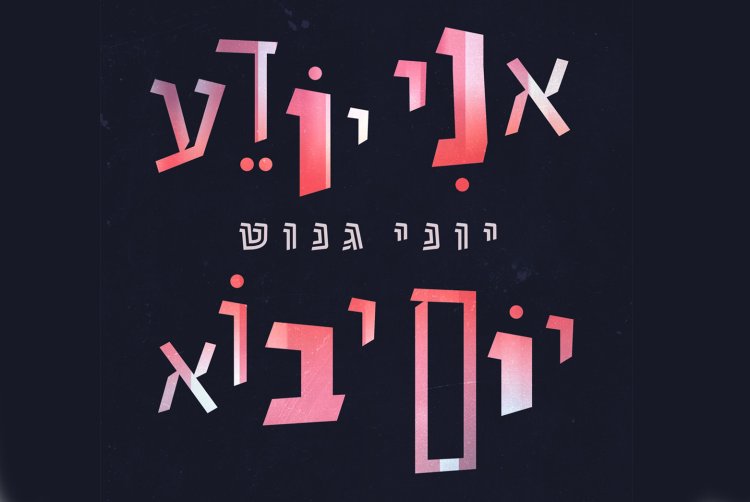Yoni Genut: "I Picked Up the Guitar and Broke Down in Tears"
"Nothing prepared me for the emotional toll of creating this album," Yoni Genut reveals as he shares the heartrending stories behind his latest work.
 Yoni Genut (Photo: Asaf Yazdi)
Yoni Genut (Photo: Asaf Yazdi)This moment is one that Yoni Genut cannot forget: he enters the studio room, shuts the door behind him, sits down with his guitar to sing and play one of his new songs for the album "I Know a Day Will Come," with the words we have all read so many times this year: "Our brothers, all the House of Israel," and suddenly, he chokes up. He cannot continue.
"Nothing prepared me for the vast emotional difficulty in producing the album," he candidly shares in a conversation we have with him shortly after the album's release. "But the truth is, nothing prepared me for the fact that I would even release an album. Last summer, just before the outbreak of the war, I was marking my fiftieth birthday and celebrating a quarter-century since the start of my musical journey. At that time, I had three albums behind me, and I assumed it would take a long time before I released a fourth one, if at all. But like everyone, I didn't imagine for a moment that a war would break out."

An Album with Hope
Genut is one of the pioneers of the original Jewish music genre, with a long-standing career—initially as the lead singer of the rock band Bein Hashmashot, and over the years collaborating with top musicians and creators. However, as mentioned, nothing prepared him for releasing an album inspired by war and all that comes with it.
So how did the idea truly come about?
"Over the past year, I had the opportunity to perform frequently for soldiers, and I noticed that despite the pain and challenging sights they encounter, there is a strong desire within them to experience the power of music. Until now, there was a well-known tune for Samson the Judge's words: 'Remember me and strengthen me just this once... that I may be avenged on the Philistines for my two eyes.' However, there weren’t many powerful songs from the prayers.
"I found myself composing the verse, 'I will pursue my enemies and overtake them, and I will not turn back until they are consumed,' and I also created a tune for the verse, 'You give me your shield of victory, and your right hand sustains me; you stoop down to make me great,' as I sing and vividly imagine our soldiers charging at the enemies, avenging all those who did these terrible things to us. Later, I heard from the soldiers that the song's words echoed in their ears while they were in Gaza fighting. It touched me so deeply to hear that, and I felt like I was truly gifting them the tune because they need it in these times."
"Then came the tune by Yossi Reshkovitz of blessed memory, who was killed in one of the battles in the region. Yossi was a man of music and notes. I knew him since our youth, playing together at events even before he became an educator and school principal. I attended his funeral at Mount Herzl, and there I heard the incredible story of the tune he composed to the verse 'Even though I walk through the valley of the shadow of death.' Yossi composed the melody while fighting deep in the Gaza Strip, crossing the valley near Beit Hanoun, surrounded by shells and fire and the fear of death in the shadow of the valley. Colonel Golan Wach fought with Yossi in Gaza and was lucky to hear the song from him in his last days. At the funeral, he shared the miraculous story: the tune slipped from his memory, but during the funeral, he suddenly remembered it, as if Yossi sent him the notes from above. I knew then that I wanted to perform the tune and so I included it in the album as well."
Genut mentions that another song on the album is attributed to Ditzah Or, the mother of the abducted Avinetan Or, who personally approached him and requested that he perform an old Piyyut (liturgical poem) named "I Will Rejoice and Be Glad," in a more modern and contemporary version, to send it to Avinetan and thereby convey connection to the Messiah and faith in redemption. "It's a very powerful Piyyut that talks about when the King Messiah comes, Hashem will set order in the world and eliminate all wickedness," he recounts.
"Also, there are songs on the album that I composed in the past but have not yet been published, and I felt that now was the opportunity to release them. For example, a particularly moving song based on a text by Rabbi Soloveitchik that talks about coping with loss and bereavement, and how it is precisely there that one connects with Hashem. I composed it 30 years ago, and it was sitting in my drawer until I decided it was time to adapt it to our era. Together with Tzur Ehrlich, I adapted it to our times, touching specifically on everything we experienced this Simchat Torah."
Songs of a Different Kind
How can you sing and play music in the midst of such a great national tragedy?
"These are not ordinary songs," Genut clarifies. "They are songs that truly take you to deeper places in the soul, and I feel that it is from those places that you can draw strength and solace. At the same time, it is important to me to stress that the album also contains joyful and upbeat tracks, with words from Psalm 'Hashem is my light and my salvation.' As a believing people, we must not only mourn and feel pain. We must strengthen ourselves and add energies of strength and even joy."
Genut pauses for a moment and admits, "The work on the album was not simple at all. There were songs that I just couldn't sing because of too much emotion and pain, and I found myself choking up with tears. I thought of the abducted, my brothers in captivity, I thought of the soldiers who were killed and the endless circle of families whose lives have changed. With every song I sang, I felt clearly that we must all cry out and plead with the Creator of the universe to grant us a year of redemption and salvation. May we be worthy."

